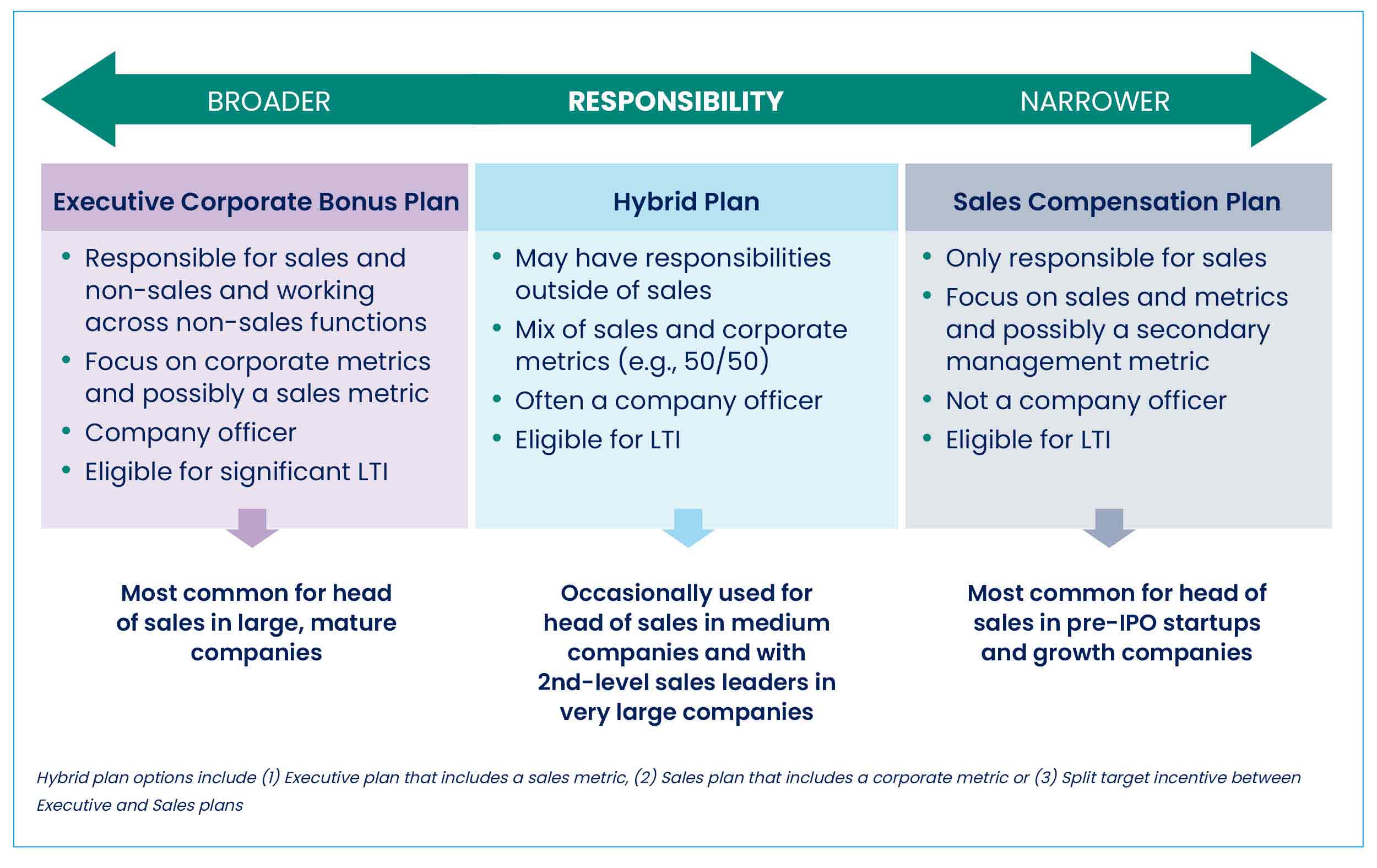For WorldatWork Members
- Sales Compensation Programs and Practices, research
- 5 Minutes With … Winnie Roberts, McKesson’s VP of Sales Compensation, Workspan Magazine article
- A Realistic Framework for Sales Performance Management Selection, Workspan Magazine article
For Everyone
- Comp Strategies for New Sales Hires: Balancing Motivation and Finances, Workspan Daily article
- Get an Alignment: How to Fix Some Common Sales Compensation Mistakes, Workspan Daily article
- 6 Keys to Help You Design Sales Comp Plans Like a Pro, Workspan Daily article
- Design of Sales Compensation, course
“Should we put our sales leader on an executive bonus plan or a sales compensation plan?”
Many organizations wrestle with this question, and practices around sales leader compensation vary. The Alexander Group’s 2024 Compensation Trends Survey found that 41% of companies use an executive bonus plan, 25% use a sales compensation plan, and 34% use hybrid plans or different plans for different leaders. Each program has its own purpose and application.
This article delves into this topic a bit deeper and offers some background and guidance to help you best answer the aforementioned question. Consider the below figure while internalizing the options.

Executive Bonus Plan: C-Suite Alignment
Executive bonus plans include company metrics like revenue and earnings before income, tax and amortization (EBITA). They can also include customized functional goals for each C-suite leader. They are typically measured and paid annually.
Executive bonus plans are suitable for sales leaders that manage sales and non-sales functions (e.g., marketing, service, customer support or operations) and/or focus on strategic cross-functional goals. They are also suitable for companies that want to drive cross-functional teaming, collective performance and strategic alignment that ultimately contribute to overall business health and success.
Sales Compensation Plan: Sales Focused
Sales compensation plans include roll-up measures aligned to their sales teams. They are typically paid monthly or quarterly based on progress against an annual quota.
Sales compensation plans are ideal for leaders who are exclusively responsible for sales and are highly involved in driving them, including co-selling on large pursuits. They are also ideal for companies that have a strong focus on driving sales outcomes.
Hybrid Executive Bonus and Sales Compensation Plan
Some companies use plan designs that incorporate elements of both an executive bonus plan and sales compensation plan. Hybrid plan options include:
- An executive bonus plan that includes a sales metric,
- A sales compensation plan that includes a corporate metric, or
- Splitting an executive’s target incentive between the executive bonus plan and sales compensation plan. For example, a recent client decided to split their sales leader’s target incentive to 50% executive bonus plan and 50% sales compensation plan.
Companies use hybrid plans when they need their sales leader to focus on sales results and collaborative work (i.e., with marketing, service, product, operations and others) to drive overall business results.
Decision Criteria
The choice between an executive bonus plan and a sales compensation plan is not straightforward, nor is it binary. The decision between plans should not occur without considering five key factors:
- Company size. The size of the company typically drives sales leader job content. Larger companies usually require their sales leaders to work closely with product functions to collaborate on product improvements as well as marketing and services to manage the nonlinear customer engagement journeys. Smaller companies require their sales leaders to work closely with their sales teams to drive sales results and often co-sell on large opportunities. Thus, larger companies typically place their sales leader on an executive bonus plan, whereas smaller companies place their sales leader on a sales compensation plan.
- Sales versus other function ownership. In some organizations, the sales leader is called a president or commercial officer, and they are responsible for sales as well as one or more functions (e.g., marketing, service). The compensation structure for such roles often reflects the need for a balanced approach that rewards not just sales numbers but also the ability to work across functions and achieve organizational alignment.
- Strategic goals. Align the compensation strategy with the company’s strategic goals. If the focus is on long-term growth and market positioning, an executive bonus plan might be more appropriate. If the goal is to drive immediate sales and market penetration, the sales compensation plan could be more effective.
- Reward philosophy. Align on your company’s reward philosophy that outlines what behaviors your company wants to encourage. An executive bonus plan will likely incent cross-functional teamwork and long-term planning, while a sales compensation plan will likely motivate more aggressive sales tactics and customer growth.
- Market standards. Consider industry benchmarks and what is competitive in your industry or market. However, recognize that your company may be different. It may be in a different growth phase. It may define its sales leader job differently. And, it may have different strategic goals and rewards philosophies.
Choosing the Right Path
The right compensation plan depends on the sales leader’s job. If the sales leader is responsible for broader company strategy and executive functions, an executive bonus plan will likely be more suitable. If the sales leader is heavily focused on sales targets and team performance, a sales compensation plan will likely be more appropriate. All things considered, the choice between an executive bonus and a sales compensation plan is not black and white. It requires a deep understanding of the sales leader’s job and the behaviors you want to drive.
Editor’s Note: Additional Content
For more information and resources related to this article, see the pages below, which offer quick access to all WorldatWork content on these topics:







